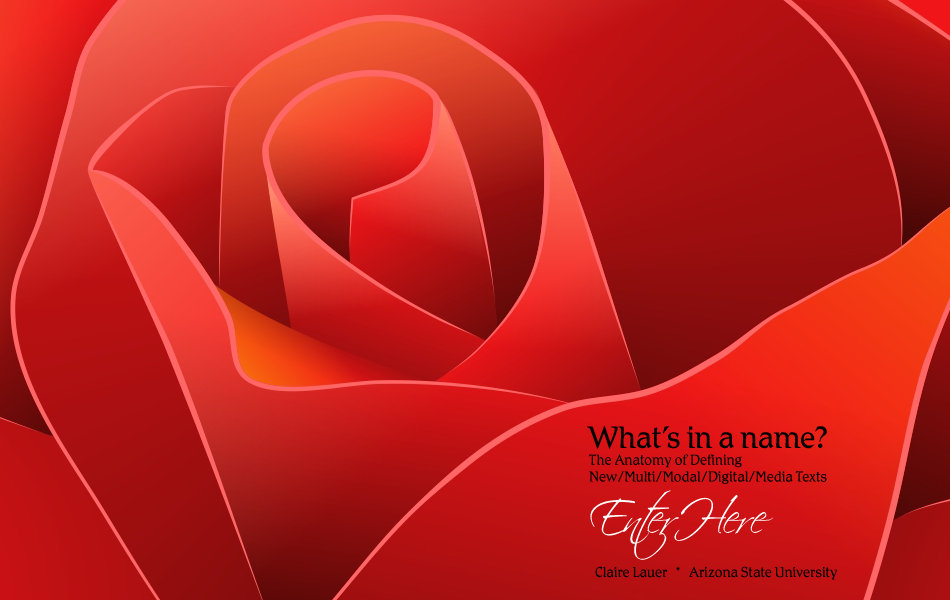The Digital Rhetoric Collaborative got its start back in May with a Blog Carnival post from Doug Eyman (and others since then) providing his perspective on the meaning of “digital rhetoric.” Eyman ended his post by asking others to contribute posts that discuss how they define digital rhetoric.
The purpose of my post is to expand the rich and layered conversation that has developed since Eyman’s initial post to include definitions not just of “digital rhetoric” but other terms we use to describe the new kinds of composing practices and technologies we’re interacting with in the classroom and our research. Examples of terms might include new media, multimodal, digital media, and multimedia. And in expanding the scope of the discussion to include these other terms, I hope also to expand our conversation about the nature and usefulness of definitions in general.
 This post is linked to a larger research project of mine published in Kairos this month called “What’s in a name?: The anatomy of defining new/multi/modal/digital/media texts.” This Kairos webtext examines how scholars in the field have used and defined these terms, and presents excerpts of interviews with scholars who use these terms regularly, including Cindy Selfe, Gunther Kress, Jonathan Alexander, Scott DeWitt, Anne Wysocki, and Jason Palmeri. In interviewing these scholars I sought to answer several questions:
This post is linked to a larger research project of mine published in Kairos this month called “What’s in a name?: The anatomy of defining new/multi/modal/digital/media texts.” This Kairos webtext examines how scholars in the field have used and defined these terms, and presents excerpts of interviews with scholars who use these terms regularly, including Cindy Selfe, Gunther Kress, Jonathan Alexander, Scott DeWitt, Anne Wysocki, and Jason Palmeri. In interviewing these scholars I sought to answer several questions:
- Were there collective understandings of these terms? Did there have to be?
- What terms are being used in what contexts?
- Are there any discernible patterns to when and where these terms appear?
- What reasoning do scholars have when they use the particular terms that they do?
- Why do scholars prefer certain terms over others?
- How do scholars justify using terms interchangeably?
Rather than discovering definitive answers to these questions, however, the conversations I had with these scholars laid the framework for a broader consideration of the anatomy of a definition: how we develop definitions and how definitions shape our work in academia, the classroom, and public life.
So I use this post as a conversation starter. I invite you to visit the Kairos webtext and interact with the voices included there. But as I was only able to interview a sampling of scholars, I hope that this blog carnival space can establish a starting point for more expansive conversations we might have about terms and their definitions and uses. Once you have visited the webtext, I invite you to contribute your own perspectives on the issues raised there, perhaps reflecting on questions such as:
- What technology-related terms do you use in your research? Teaching? Administration? How do you define those terms? How have those definitions evolved?
- What are your reactions to what is being said in these excerpts? What can you relate to? Agree with? Disagree with? Approach differently?
- Should we reach consensus on our understanding of these terms, even partially? What do we risk by doing so? What do we risk by NOT doing so?
- Why are definitions important? Why do they matter?
Do keep in mind that the interviews I use throughout the webstext were collected between 2007 and 2010, so please be a generous listener and consider the quotes in their original technological context, not as if they were spoken yesterday. It is very likely that scholars interviewed back in 2007 may wish to revise their responses somewhat considering what they have experienced in the years since. But the evolution of our understandings of these terms is as interesting to observe as any consensus we may ultimately arrive at. And as this is a conversation that I think we’ll be having for quite some time, I look forward to your perspectives!

3 Comments
Read Liz Homan’s reflections on Lauer’s post: http://lizhoman.wordpress.com/2012/08/27/words-iwe-use-to-talk-about-tech-text/
I’m developing a sabbatical proposal and the ideas presented here have helped me understand how to articulate why creating a multimodal text takes more time and a different way of thinking about text and information-giving. I’ve begun on Prezi because I am a non-linear composer, but I’m not certain where I will wind up in the end.
Wish I saw this when I was writing a guide for my students. Anyway, here are my two cents: https://jasontham.com/2015/05/19/multimedia-vs-multimodal-a-matter-of-terms/